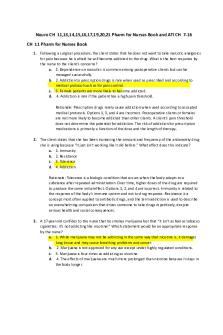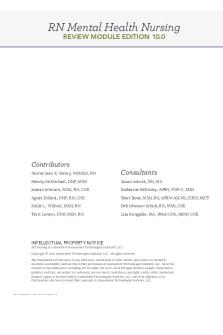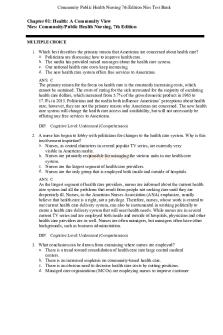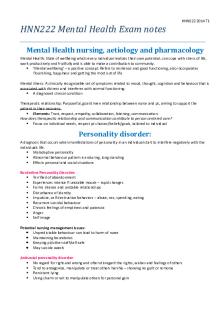Introductory Mental Health Nursing 4th Edition Womble Kincheloe Test Bank PDF

| Title | Introductory Mental Health Nursing 4th Edition Womble Kincheloe Test Bank |
|---|---|
| Author | Melissa Daugherty |
| Course | Fundamentals of Nursing |
| Institution | Stone Academy |
| Pages | 143 |
| File Size | 4.7 MB |
| File Type | |
| Total Downloads | 84 |
| Total Views | 146 |
Summary
test bank for med surg. gives student opportunity to study from test bank that will help. Gives description of each test bank....
Description
Introductory Mental Health Nursing 4th Edition Womble Kincheloe Test Bank Chapter 1 Mental Health and Mental Illness
1.
When studying mental health and mental illness, the student nurse learns that which of the following is evidence of our mental health?
A)
Our ability to function well with others
B)
Our ability to defend what we believe
C)
Our ability to perform demanding tasks on the job
D)
Our ability to defend those weaker than we are
2.
A mental health nurse is teaching a class in anger management. She teaches the patients that recognizing what triggers their anger response allows them to do which of the following?
A)
Manipulate the situation to get what you want
B)
Stand up for ones beliefs against the cultural beliefs of a community
C)
Gives them the opportunity to gain control of their anger
D)
Control the things that trigger their anger
3.
Which of the following are factors that could be part of a persons cultural identity? (Select all that apply.)
A)
Common family customs
B)
Common language
C)
Common stressors
D)
Gender
E)
Adaptive resources
4.
What would a culturally competent nurse know that some cultural and ethnic groups feel that mental illness is caused by?
A)
Demon possession
B)
Pretense
C)
The stars
D)
Hypnosis
5.
A staff educator is discussing stress and its impact on a disease process, whether it is physical or mental. What would be the best statement about stress that the educator could give?
A)
Stress can be prostress or distress.
B)
Stress can never enhance the feeling of well-being.
C)
Stress can be either physically or emotionally exhausting, but not both.
D)
Distress is actually harmful to ones health.
6.
A patient comes to the clinic to see the Mental Health Nurse Practitioner. The patient states, I seem to be miserable and upset all the time. My marriage is crumbling because my wife refuses to understand how I feel. What does the nurse practitioner understand about the factors contributing to the patients stress?
A)
Internal situations often make us miserable and upset
B)
External situations often make us miserable and upset
C)
We choose to make ourselves miserable and upset
D) 7.
We choose to live with chronic stress As a mental health nurse, you know that when a person feels insulted, mental images of resentment and animosity may be formed. These images generate what?
A)
The need to fight back
B)
The need to change their behavior
C)
The need to project blame onto the other person
D)
The need to manipulate the situation
8.
Mental health nurses know that stress management is an important part of patient care. What is one way a mental health nurse could help the patient cope with stress?
A)
Teach mentalization
B)
Teach hypnosis
C)
Teach imagination
D)
Teach visualization
9.
To help patients deal with their stress, nurses must also learn to cope with their own. Which of the following is an adaptive coping strategy that might be used by the nurse?
A)
Reframing
B)
Mediation
C)
Asset training
D)
Mental blocking
10.
A)
An 18-year-old college student is very anxious about auditioning for the schools famous chorale. Which of the following ways of dealing with this anxiety would the nurse recognize as being maladaptive? Arranging for voice lessons
B)
Practicing the songs used in the audition
C)
Going to a concert
D)
Singing with a group of friends
11.
Several steps occur in the crisis sequence. What is one of these steps?
A)
Organization recurs
B)
Violence
C)
Autonomic response
D)
Peripheral nervous system response
12.
A 70-year-old man is admitted to the hospital in a severe state of malnutrition. The nurse learns that he lost his wife 3 months ago and is living alone in a rural area. His family lives at a great distance and rarely visits him. He is not eating for several days at a time and is not paying his bills. He is now without electricity and phone service at his home. When his son asks the nurse what is wrong with his father, what would be the nurses best response?
A)
He is grieving for his wife.
B)
He has colon cancer and is dying.
C)
He has a malabsorption disorder.
D)
He feels alone and useless.
13.
A 28-year-old woman, whose husband and two children were killed in a hurricane 3 years ago, has dated several men in the past 18 months. She has never allowed a serious relationship to develop, always finding a reason to end the relationship after a couple of months. What is a reason that this woman may not be able to form a serious, lasting relationship with a man?
A)
Unresolved grieving from a loss when she was 15 years old
B)
The patient has had multiple losses
C)
Guilt with regard to circumstances at or near the time of loss
D)
14.
The patient has ambivalent feelings toward the lost person A new nurse has just begun work in a mental health facility. During orientation, the nurse learns about chronic sorrow. What should this nurse learn that is considered chronic sorrow?
A)
Twelve continuous months of coping with a loss
B)
Inability to complete the coping process
C)
A prolonged and intensified resolution
D)
A prolonged and intensified reaction
15.
A patient who responds to acute stress by fleeing from the situation is demonstrating the fight-or-flight response. Which of the following describes this response?
A)
A surge of adrenalin into the bloodstream in response to an immediate threat
B)
A lapse of judgment that causes a person to avoid consequences
C)
A positive response to an insulting situation
D)
A result of chronic stress
16.
The nurse is caring for a patient whose husband is dying. The patient says that the doctors caring for her husband are very good and that she knows her husband will recover. The nurse recognizes that the patient is likely in which stage of grief?
A)
Anger
B)
Denial
C)
Acceptance
D)
Bargaining
17.
As a mental health nurse, you are initiating therapeutic strategies for a patient who is in psychological crisis. You initiate therapeutic strategies that are designed to do what?
A)
Teach the person in crisis a lesson
B)
Assist in preventing future emotional states of dysfunction
C)
Assist in identifying future behaviors
D)
Teach the person in crisis how to diffuse the anger
18.
During the mental health clinical rotation, a student nurse asks what types of triggers increase stress levels. What would be the most likely answer the student nurse could get?
A)
Expected triggers
B)
One-time triggers
C)
Intense triggers
D)
Controllable triggers
19.
A patient on the medical/psychiatric unit has been seen pacing back and forth in his room. The nurse asks him what is wrong. The patient responds, I dont know. What is this an example of?
A)
Stress
B)
Anxiety
C)
Distress
D)
Grief
20.
A nurse is collecting data on a new patient in the clinic. What is the best question the nurse might ask the patient to elicit data on the patients mental health?
A)
What family members do you live with?
B)
Do you often change things in your life?
C)
How do you feel about yourself?
D)
What do you do for a living?
Answer Key
1.
A
2.
C
3.
A, B, D
4.
A
5.
D
6.
C
7.
A
8.
D
9.
A
10.
C
11.
C
12.
A
13.
B
14.
D
15.
A
16.
B
17.
B
18.
C
19.
B
20.
C
Chapter 2 The Delivery of Mental Health Care
1.
Who was the first nurse trained in mental health nursing in the United States?
A)
Florence Nightingale
B)
Linda Richards
C)
Harriet Bailey
D)
Dorothea Dix
2.
A 19th century school teacher worked to expose the conditions of patients with mental problems. Because of this person, mental hospitals that had standards of care were constructed. Who was this person?
A)
Benjamin Rush
B)
Linda Richards
C)
Harriet Bailey
D)
Dorothea Dix
3.
What act of legislation provided funds for research, advanced nursing degree programs, and improved community service for individuals with mental illness?
A)
Joint Commission on Mental Illness and Health in 1955
B)
National League for Nursing 1953
C)
National Institute of Mental Health 1949
D)
National Mental Health Act of 1946
4.
In the mid 1950s, antipsychotic drugs were introduced. As medications made caring for the mentally ill somewhat easier, what movement gained momentum?
A)
The move to deinstitutionalize mentally ill clients
B)
The move to use electric shock therapy for depressed clients
C)
The move to use antipsychotic drugs instead of restraints
D)
The move to improve the conditions in mental health hospitals
5.
Research has shown that people in minority groups do not always receive the care they need for mental illness. The barriers to accessing mental health care include what? (Mark all that apply.)
A)
High abuse rate in family
B)
Low socioeconomic status
C)
Low educational levels
D)
Limited income
E)
High physical needs of family
6.
The nurse is admitting a 36-year-old Arabic female diagnosed with severe postpartum depression to the mental health unit. The culturally sensitive nurse is aware that cultural incompetence among mental health providers and professionals is what?
A)
The reason minorities do not seek health care
B)
Nonexistent in the United States
C)
The single most pivotal barrier to equality in delivery of mental health care
D)
Rampant in third world countries
7. A)
When admitting a patient to a mental health setting, what does the nurse do to aid in preserving the rights of the client? Give the client the opportunity to read the Mental Health Systems Act Bill of Rights
B)
Send a copy of the Mental Health Systems Act Bill of Rights home with a family member
C)
Read the client the Mental Health Systems Act Bill of Rights
D)
Tell the client of his or her rights
8.
In the child behavioral unit on which you work with the family of a prospective patient, you are having a discussion with the mother. The mother asks you how she knows her child will not be mistreated when he misbehaves. What is the best statement in the Patient Bill of Rights to discuss with this mother regarding her childs treatment?
A)
Be treated with dignity, concern, and respect at all times
B)
Expect quality care provided by trained and competent professional providers
C)
Be treated in the least restrictive setting
D)
Receive explanations of treatment and be involved in the planning of care
9.
A client is admitted on an emergent basis to a local mental health facility after being detained by the police when he was found walking naked down the middle of a four-lane highway. The nurse knows that the client can be held for what length of time?
A)
7284 hours
B)
4872 hours
C)
3648 hours
D)
2436 hours
10.
You work in a mental health facility and are admitting a client who has been brought to the emergency department of a local hospital after being picked up while attempting to jump from the rail of a bridge. The physician feels that the patient is serious about attempting suicide and so sends the patient to you for admission. What type of admission would you document this as?
A)
Emergent
B)
Routine
C)
Voluntary
D)
Involuntary
11.
On admittance to a mental health unit, a client tells the nurse that he or she does not want anyone to know that he or she is a patient there. The next day the nurse receives a phone call requesting information about the client. The nurse refuses to acknowledge that the client is a patient on the unit. What is the best way to describe how this nurse is acting?
A)
Confidently
B)
Legally
C)
Ethically
D)
Privately
12.
What does the Health Insurance Portability and Accountability Act (HIPAA) of 1996 hold mental health care professionals legally and ethically responsible for?
A)
Portability of medical records
B)
Accurate documentation
C)
Correct billing of insurance companies
D)
Client confidentiality
13.
As a student nurse, you are accountable for the care that you provide. Where would you find the scope and minimum standard of practice for the care you provide?
A)
Student Nurses Practice act for the United States
B)
American Nurses Association website
C)
Student Nurses Association website
D)
Nurse practice act of your state
14.
While providing care to a client who has moderate to severe Alzheimer disease, a mental health nurse has what responsibility?
A)
Protecting the clients rights
B)
Disclosing information only to family members
C)
Keeping the patient on a locked unit
D)
Being within arms length of the patient at all times
15.
Federal regulations and Joint Commission standards regulate the use of seclusion and restraints by health care workers. What do these regulations mandate with regard to the use of restraints?
A)
Restraints can only be applied in the presence of a physician
B)
Restraints can be applied under the supervision of a licensed nurse
C)
Restraints can only be applied under the supervision of a registered nurse
D)
Restraints can only be applied if nursing orders are on the chart
16.
You are caring for a client who is under 24-hour suicide watch when the client becomes very aggressive and belligerent. When you are trying to talk the client down, the client hits you. What would you recommend for this client?
A)
Seclusion
B)
Restraints
C)
Time-out
D)
Demerits
17.
As a mental health nurse, your possible practice settings include what? (Mark all that apply.)
A)
Long-term care facilities
B)
Home-health care
C)
Outpatient surgery clinics
D)
Hospital units
E)
Ophthalmic clinics
18.
As an emergency department nurse, you deal with some mentally healthy clients who are experiencing a temporary mental instability. What type of nursing would you practice in this situation?
A)
Family care nursing
B)
Crisis intervention nursing
C)
Adult health nursing
D)
Situational nursing
19.
Holistic nursing is practiced in every practice setting. Because of this, no matter what the health care setting, what should the nurse be prepared to do?
A)
Help others follow the policies of the institution they are working in
B)
Practice nursing according to Peplaus theory
C)
Be prepared to initiate interventions to address the psychosocial needs of each client
D)
Care for the physical needs of the patient exclusively
20.
What must a nurse in a correctional facility provide to a patient newly diagnosed with HIV?
A)
Compassion and strength
B)
Counseling and support
C)
Empathy and strength
D)
Sympathy and support
Answer Key
1.
B
2.
D
3.
D
4.
A
5.
B, C, D
6.
C
7.
A
8.
A
9.
B
10.
D
11.
C
12.
D
13.
D
14.
A
15.
C
16.
B
17.
A, B, D
18.
B
19.
...
Similar Free PDFs

ATI TEST - mental health nursing
- 38 Pages

Uworld Mental Health Nursing
- 168 Pages

Test Bank for Ch01---4th edition
- 21 Pages

ebook for mental health nursing
- 219 Pages

Community Health Test Bank
- 10 Pages
Popular Institutions
- Tinajero National High School - Annex
- Politeknik Caltex Riau
- Yokohama City University
- SGT University
- University of Al-Qadisiyah
- Divine Word College of Vigan
- Techniek College Rotterdam
- Universidade de Santiago
- Universiti Teknologi MARA Cawangan Johor Kampus Pasir Gudang
- Poltekkes Kemenkes Yogyakarta
- Baguio City National High School
- Colegio san marcos
- preparatoria uno
- Centro de Bachillerato Tecnológico Industrial y de Servicios No. 107
- Dalian Maritime University
- Quang Trung Secondary School
- Colegio Tecnológico en Informática
- Corporación Regional de Educación Superior
- Grupo CEDVA
- Dar Al Uloom University
- Centro de Estudios Preuniversitarios de la Universidad Nacional de Ingeniería
- 上智大学
- Aakash International School, Nuna Majara
- San Felipe Neri Catholic School
- Kang Chiao International School - New Taipei City
- Misamis Occidental National High School
- Institución Educativa Escuela Normal Juan Ladrilleros
- Kolehiyo ng Pantukan
- Batanes State College
- Instituto Continental
- Sekolah Menengah Kejuruan Kesehatan Kaltara (Tarakan)
- Colegio de La Inmaculada Concepcion - Cebu










